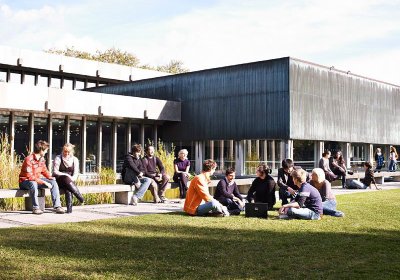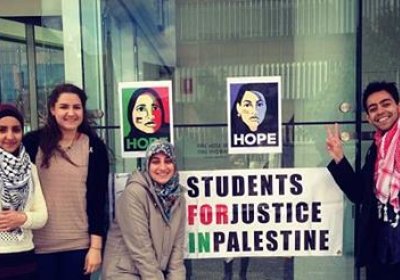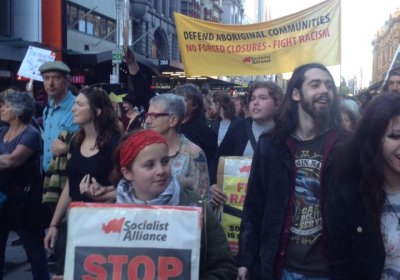Palestinian Authority (PA) foreign minister Riyad al-Maliki has described Venezuela as “Palestine's most important ally”, Venezuelanalysis.com said on May 19. Al-Maliki made the comments while in Caracas for bilateral talks with Venezuela's socialist government.
Education
 A student action against education cuts was held at the University of Sydney on May 20. It was organised by the National Union of Students. Greens Senator Lee Rhiannon talked about the fantastic campaign in Chile for free education and how students here should take inspiration from the mass campaign there that made it happen. Photo: Pip Hinman.
A student action against education cuts was held at the University of Sydney on May 20. It was organised by the National Union of Students. Greens Senator Lee Rhiannon talked about the fantastic campaign in Chile for free education and how students here should take inspiration from the mass campaign there that made it happen. Photo: Pip Hinman. Chile has been hit by another round of protests by student groups demanding substantial reforms to the country’s education system.
Two student activists were killed in Chile on May 14 amid nationwide protests. The two students were shot in the city of Valparaiso, near the Plaza Victoria, at the end of a huge rally. Local media said both students were gunned down by a Valparaiso store owner as they attempted to hang a banner over his shop.
Chile has been hit by another round of protests by student groups demanding substantial reforms to the country’s education system.
Two student activists were killed in Chile on May 14 amid nationwide protests. The two students were shot in the city of Valparaiso, near the Plaza Victoria, at the end of a huge rally. Local media said both students were gunned down by a Valparaiso store owner as they attempted to hang a banner over his shop.
Mexican gov't blocks investigation over missing students
 Demonstrators demanding justice in the case of the 43 disappeared Ayotzinapa students. Photo: Clayton Conn/TeleSUR.
The lawyer representing the parents and relatives of 43 missing Ayotzinapa students criticised the Mexican government on May 14 for stopping a meeting between experts from the Inter-American Court of Human Rights and army officials.
Demonstrators demanding justice in the case of the 43 disappeared Ayotzinapa students. Photo: Clayton Conn/TeleSUR.
The lawyer representing the parents and relatives of 43 missing Ayotzinapa students criticised the Mexican government on May 14 for stopping a meeting between experts from the Inter-American Court of Human Rights and army officials.
 Demonstrators demanding justice in the case of the 43 disappeared Ayotzinapa students. Photo: Clayton Conn/TeleSUR.
The lawyer representing the parents and relatives of 43 missing Ayotzinapa students criticised the Mexican government on May 14 for stopping a meeting between experts from the Inter-American Court of Human Rights and army officials.
Demonstrators demanding justice in the case of the 43 disappeared Ayotzinapa students. Photo: Clayton Conn/TeleSUR.
The lawyer representing the parents and relatives of 43 missing Ayotzinapa students criticised the Mexican government on May 14 for stopping a meeting between experts from the Inter-American Court of Human Rights and army officials.
 Photo: NSW Education Action Network/Facebook.
Students took to the streets on May 12, budget day, to call for free education and an end to the fee deregulation bill.
Photo: NSW Education Action Network/Facebook.
Students took to the streets on May 12, budget day, to call for free education and an end to the fee deregulation bill.
I have never really thought about the impact free education has had on me. Where would my life be if I had to pay to get an education? I am from Denmark. I would certainly not be here in Australia; I might not even have gone to high school.
Rallies have been called in response to the federal government’s attack on education funding in the upcoming budget, and a big one is planned for Sydney on budget day, May 12.
Although Christopher Pyne’s education policies have been repeatedly defeated in the Senate, he is determined to continue to try to “fix” the education system by reducing governmental funding and pushing for fee deregulation. The next chance he will have to do this is with mass education spending cutbacks in the budget.
The University of Western Australia (UWA) cancelled the contract for Bjorn Lomborg’s Consensus Centre on May 8 after a "passionate emotional reaction" to the plan.
In a statement, UWA Vice Chancellor Paul Johnson said the creation of the centre had attracted "mixed reactions" from staff, students and the general public.
"The scale of the strong and passionate emotional reaction was one that the university did not predict," he said.
Macquarie University has suffered a setback in its courtroom battle against seven students associated with the Macquarie University Postgraduate Research Association (MUPRA).
On May 7, the Supreme Court recommended mediation, which was agreed to by both parties. The university also agreed to release MUPRA funds for legal representation in a future mediation hearing.
The mediation hearing is set by May 28, and the verdict will be released in a month, if a result is not reached through the mediation process beforehand.
In a period of so-called “budget emergency” when deep funding cuts are being imposed on universities and scientific research, the federal government has managed to find $4 million for a “consensus centre” headed by advocate for climate inaction Bjørn Lomborg.
The $13 million centre will form part of the University of Western Australia’s (UWA) business school, with the Commonwealth contributing $4 million over four years.
Activists, students and academic staff met at the University of Sydney on April 29 to discuss the university’s recent attacks on those involved in a protest against a lecture given by an Israeli colonel on March 11.
We live in a time of growing inequality between the rich and poor, when the environment is being destroyed to the point of threatening our very existence, because of a system that prioritises profit. Here are 10 reasons why socialism is the way forward to solve society’s problems.
1. THE DESTRUCTION OF CLASS DIVISION
Under capitalism, people are divided on the basis of class. There are the 1%, who own the wealth and the means to produce wealth, and the rest of us, the 99%, who sell their labour to produce profit for the 1%.
- Previous page
- Page 31
- Next page







